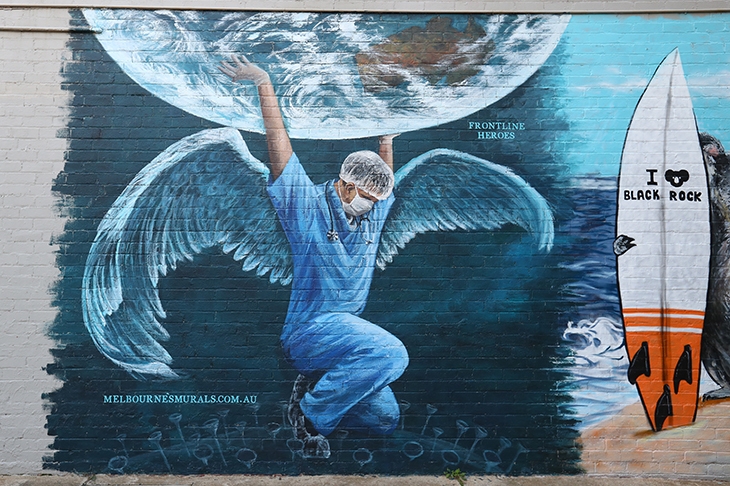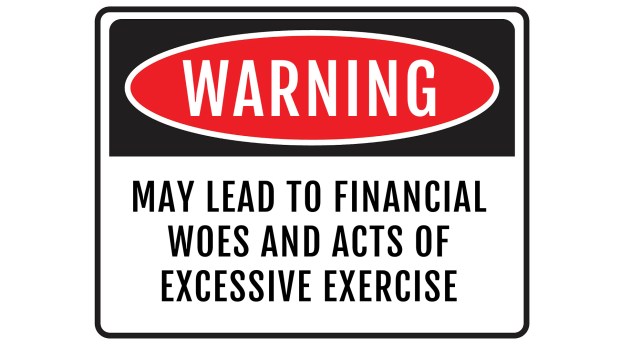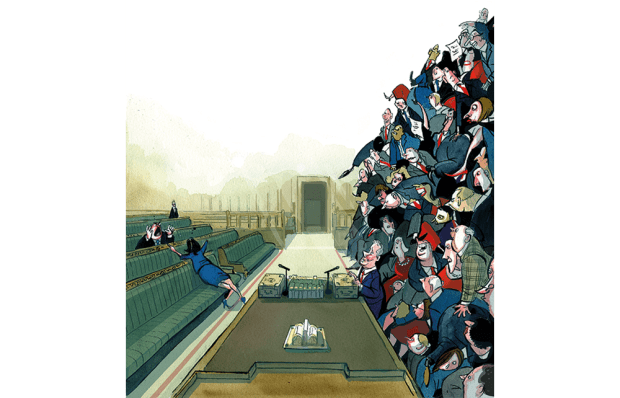A glimmer of hope
Sir: After the debacle of the West’s shambolic withdrawal from Afghanistan, it was comforting to read two of the articles in last week’s Spectator (28 August). The first was Rod Liddle’s explanation as to how we got there in the first place (‘I blame Tony Blair’) and the second was John Casey’s piece about Ahmad Massoud and the mention of his late father, the messianic Ahmad Shah Massoud (‘Fatherland’).
Very often out of a dire situation something positive can appear. It may be that the arrival of Ahmad Massoud as the leader of the National Resistance Front, the potential he has of being the head of the Tajiks, along with his understanding of Afghani divisions, will give Afghanistan the hope of a settled future.
Although I am both a dog lover and dog owner, my final thought is this: how did we arrive at the point where some of our nation believes the transport of rescue dogs to the UK is more important than ensuring our nationals, as well as those Afghan nationals who put their lives on the line, are repatriated to the UK?
John Wick
Worthing, West Sussex
Blair’s legacy
Sir: Rod Liddle is so right when he says that arrogance, naivety and ignorance underpinned the foreign policy which gave us the Iraq and Afghanistan disasters (‘I blame Tony Blair’, 28 August). The same can be applied to Blair’s policy on devolution, which created the conditions for the rise to prominence of nationalist politicians dedicated to the destruction of the Union. I too would like to see some contrition from a man whose strategic miscalculations have so obviously landed us in the mess we are now in.
J. Green
By email
Wishful drinking
Sir: I think Bruce Anderson (Drink, 28 August) had overindulged with the Palo Cortado Apóstoles if he thinks that Tony Blair is ‘the only person who makes sense’. I recommend him to Rod Liddle’s column in the very same issue.
Nigel à Brassard
London SW7
Shuttered island
Sir: The publication of Alexander Downer’s article (‘Fortress Oz’, 28 August) on the current situation in Australia could not be more resonant. At the onset of the pandemic last year, I (then 36 weeks pregnant) and my New Zealand-born husband made the decision to weather the Covid-19 storm here in London, where we have worked for the past five years. Our son is now almost 16 months old. He has never met my widowed mother in Sydney; he is her only grandchild. I have not seen her since 2018 — almost four years ago.
While the current draconian border restrictions in place in Australia may be saving Australian lives from the virus, they are meanwhile causing increasingly severe suffering for families such as my own.
When will the Australian government outline a realistic plan to reunite its expat nationals with their families? It is now a matter of the utmost urgency. We have been ignored and forgotten for too long.
Nicole Mansour
London W1
Dead right
Sir: Charles Moore writes of the Times obituarists’ unfair habit of dwelling disproportionately on whichever aspect of their subjects’ lives will provide the most attention-catching introduction (Notes, 28 August). When my father-in-law Sir Reginald Hibbert died, I was deputed to keep my mother-in-law company during the period between death and burial. Every morning I drove into the village to buy whichever papers had published an obituary of her husband. On the day I opened the Times, I was aghast to read: ‘Sir Reginald Hibbert, Her Majesty’s Ambassador at Paris from 1979 to 1982, was not a comfortable man. In a service of the smooth he stuck out like a sore thumb.’ The words ‘abrasiveness’, ‘prickliness’ and ‘arrogance’ glared out from the text. For a mad instant I wondered whether to put the paper back on the shelf and say to Ann: ‘Nothing today.’ But knowing she was keenly waiting for that newspaper to complete her collection, this would be mere postponement rather than a solution. There was an anxious silence while she read the piece, then, musingly: ‘I think this is the only one which really got Reg.’
Maria Lucas-Tooth
London W8
Sleeping sickness
Sir: I read with interest Susan Hill’s piece about post-viral syndrome (‘The long haul’, 28 August). In 1966, aged 22, I contracted glandular fever. I recovered within a month and experienced no sequelae until the late 1990s, when I was diagnosed with rheumatoid arthritis, an auto-immune disorder. The consultant who made the diagnosis explained that it was consequent upon an earlier viral infection and may have been asymptomatic, perhaps for many years. When he enquired about my clinical history, he linked it to the glandular fever I had experienced some 30 years earlier. In addition to pain in joints, the symptoms of rheumatoid arthritis include the chronic fatigue that characterises ME.
Peter Morrell
Nassington, Northants
Making Merry
Sir: I am surprised that Merrydown Cider was not mentioned in Henry Jeffreys’s review of Cider Country (Books, 14 August). There was a small pub in Kentish Town which mainly sold Merrydown Cider and which, because the cider was so strong, served it to ladies in a schooner and men in half-pints. If a customer went back for a second half, the publicans would scrutinise them to ensure they could hold their liquor. I believe it was eventually taxed heavily to reduce its consumption.
Paul Taylor
Ardingly, West Sussex
Got something to add? Join the discussion and comment below.
Get 10 issues for just $10
Subscribe to The Spectator Australia today for the next 10 magazine issues, plus full online access, for just $10.
You might disagree with half of it, but you’ll enjoy reading all of it. Try your first month for free, then just $2 a week for the remainder of your first year.














Comments
Don't miss out
Join the conversation with other Spectator Australia readers. Subscribe to leave a comment.
SUBSCRIBEAlready a subscriber? Log in